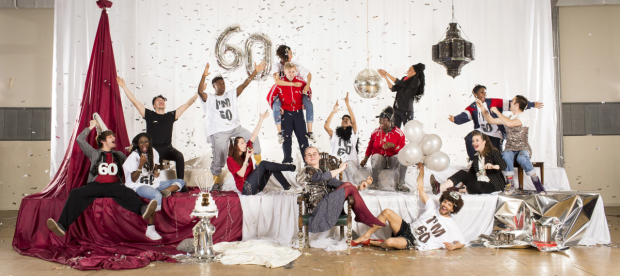Sarah Crompton: Is the National Youth Theatre still seen as a middle-class preserve?
As the NYT approaches its 60th birthday, Sarah looks back on its alumni, some controversial moments in its history, and the need to offer initiatives that aren’t about privilege or money

© Helen Maybanks
On Sunday, the National Youth Theatre celebrates its diamond jubilee with a glitzy gala starring famous alumni including Matt Smith, Timothy Dalton, Hugh Bonneville, Daisy Lewis, Jessica Hynes and Gina McKee appear alongside nearly 100 current members.
It’s an impressive line-up and the NYT has been an impressive force in British theatre ever since it was founded in 1956 by Michael Croft who wanted to give the boys he had been working on productions with at Alleyn’s school, South London a chance to carry on acting in the school holidays. From that small seed, a strong tree grew. The actors the youth theatre has produced – Helen Mirren, Daniel Day Lewis, Daniel Craig, Chiwetel Ejiofor, Catherine Tate, Orlando Bloom among them – are almost as numerous as the famous names its rigorous audition process has rejected (Eddie Izzard, Jamie Cullum and their own current chair Dawn Airey).
No wonder more than 5,000 youngsters, aged between 14 and 25, audition each year for a chance to go on courses in the skills of theatre, on and off stage, which then automatically qualify them for a chance to audition for high-end productions. Between 500 to 750 are lucky enough to be taken on. Some of their efforts will be recognised this year in a season of plays at the Ambassadors Theatre, London, from September 23, when the REP company will perform a version of Romeo and Juliet and an adaptation of the novel Pigeon English, which focuses on the subject of knife crime.
The words national, youth, and theatre, have all at various times been "totally irrelevant and snubbed"
A similar season last year produced Evan Placey’s Consensual, a much-praised play on the theme of the age of sexual consent. Last year also saw the NYT hitting the headlines for what artistic director Paul Roseby describes as all the wrong reasons, when it cancelled a production of Homegrown, a play about Islamic radicalisation. Roseby insists the reason for the cancellation was on the grounds of quality; but there were rumblings about free speech.
It was a rare moment of controversy in what has been a remarkably consistent 60 years, during which, as Roseby points out, the words national, youth, and theatre, have all at various times been "totally irrelevant and snubbed". "We’ve sometimes been dismissed as out of touch and elitist, but those things have never been the case, it’s just that sometimes they have not been in fashion," he says.
His aim has been to keep the organisation relevant, and bring it up to date in terms of reach, content and diversity. Hence the edgy subjects it presents in drama; hence too the increasing number of outreach schemes, including one which offers youngsters who have fallen out of full-time education a course of study that enables them to pursue a career in theatre.
Among the young people I know who are studying drama, the NYT is still seen as a middle-class preserve
There is no doubt that both the NYT’s heart and its activities are in the right place. Last year, it offered £100,000 in bursaries to enable young theatrical hopefuls without money to take part. As Helen Mirren proudly proclaims on its website: "The NYT at this moment in time is incredibly important because the way the business is going, it’s the prerogative only of kids who have got money. It was my way in because we didn’t have money to send me to drama school."
Yet ironically, among the young people I know who are studying drama, the NYT is still seen as a middle-class preserve, the learning ground of those who are already committed to drama thanks to their experiences at private schools. Roseby is aware of this perception, and admits there is truth in it. "In terms of our audition process, you have to be ready to join the company. Theatre is, as we know, middle-class because it relies on the middle-class audience to be able to put bums on seats.
"But what we have done to counterbalance that is to offer up totally free initiatives that are not about privilege and money and bank accounts. They are about talent and opportunity. The REP and Playing Up are two totally free one year courses, with travel and bursaries."
The result, he says, is a mixed society of all classes and backgrounds. "If you join the NYT, you are with people who are not like you. I think the country needs a bit more of that sort of inclusion in terms of breaking down those barriers. Talent is the criteria." Which isn’t a bad motto for the next 60 years.
National Youth Theatre's The Story of Our Youth: A Diamond Gala runs at the Shaftesbury Theatre on 18 September.












